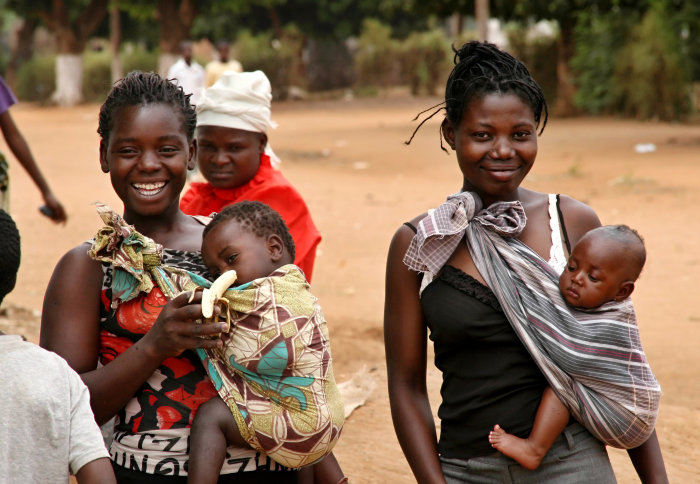Innovative finger prick test could improve maternal healthcare across the globe

Mothers in Mozambique, credit: Vladislav T. Jirousek / Shutterstock.com
A social enterprise that aims to bring vital prenatal care to isolated regions has won the Venture Catalyst Challenge.
Momoby, founded by Ana Luisa Neves and Andrea Rodriguez-Martinez from the Department of Surgery & Cancer, is developing a small device that can test for diseases with a known impact on pregnancy using a single drop of blood.

The team were awarded the £20,000 top prize at the Venture Catalyst Challenge (VCC) showcase event - held during Imperial's Enterprise Week.
The VCC, which is powered by digital venture builder Blenheim Chalcot, supports deep science and early-stage tech startups founded by Imperial students.
Over a six-week period, the programme provides participants with access to workshops, professional business coaching, and 1-2-1 mentoring sessions with industry leaders to help them turn their innovative ideas into new technologies, products and businesses.
Momoby joined seven finalists to battle it out for a share of a £40,000 prize fund on Thursday 22 March.
Changing lives
Almost 300,000 women die of preventable causes related to pregnancy and childbirth every year, and 99% of all maternal deaths occur in developing countries, Ana-Luisa explained. Almost half of these are related to infectious diseases.

The World Health Organisation recommends that all women, wherever they are in the world, be tested for hepatitis, syphilis, and HIV. This is a challenge in isolated communities and developing countries, where testing can be unavailable or inaccessible for most women, she said.
Ana-Luisa saw this first hand when she was working as a volunteer doctor in Mozambique in 2013. Speaking at the VCC final, she said: “Pregnant women would wait outside the clinic from the early hours of the morning, but when the healthcare provider arrived there would be no tests available.
"In the best case scenario, they would be advised to walk for many hours to distant facility to get their blood taken, where it would be transported over long distances to be tested at a hospital. Of course many women would not do this, and wouldn’t get the tests or treatment they needed.”
To tackle this, Momoby are developing an effective, pocket-sized, low-cost finger prick test that can be used to test for key infectious diseases affecting pregnancy at the bedside. The test would allow for timely diagnosis, treatment and better health outcomes for both mother and baby.
Creativity, tenacity, passion
Momoby were selected as the winners by a panel of expert judges, including Professor David Gan – Vice President (Innovation) at Imperial, Manoj Badale – Founder and Managing Partner at Blenheim Chalcot, Sheriden Ash – Technology and Investments Director and Women in Technology Leader at PWC (UK), Auriol Stevens – CEO and Director at VTC Group, and Tracy De Groose- CEO at Dentsu Aegis Network UK & Ireland.

The panel also awarded £10,000 to Mitt Prosthesis, founded by undergraduate Mechanical Engineering students Joshua Chidwick and Nathan MacAbuag, who are developing comfortable, affordable, plug-and-play upper limb prosthetic devices.
£4,500 was awarded to two teams – Tagless, who are creating a cost-effective protective coating against graffiti & tagging, and Finite, who have developed a construction material made from desert sand which has less than half the carbon footprint of concrete.

Professor David Gann, Vice President (Innovation) at Imperial said: “Imperial’s Venture Catalyst Challenge celebrates the very best of Imperial’s unique entrepreneurial ecosystem. This year’s finalists have gone further than ever before. They are developing game-changing businesses with the potential to transform society – tackling air pollution, solving global health challenges, and developing new sustainable materials. Their creativity, tenacity, and passion are truly inspiring.
“We are very grateful to Blenheim Chalcot for their generous support of the programme, and for sharing their invaluable business expertise with this year’s finalists.”
Entrepreneurial ecosystem
The number of new startup companies founded by Imperial students and researchers has more than doubled in the past five years. There are now a record 136 active startups founded by members of the Imperial community. These companies support more than 1,300 jobs, and have collectively generated close to £900m of investment since 2012.
The College’s first Review of Enterprising Activity, published earlier this year, points to a boost in support for enterprise and innovation at the College through programmes such as the Enterprise Lab, as well as the expanding entrepreneurial ecosystem at Imperial’s White City Campus, including the White City Incubator.
Article text (excluding photos or graphics) © Imperial College London.
Photos and graphics subject to third party copyright used with permission or © Imperial College London.
Reporter
Deborah Evanson
Communications Division